By Sami Zaptia.
London, 11 July 2020:
UNSMIL condemned today what it chose to refer to as the ‘‘clashes’’ that took place in the western Tripoli suburb of Janzur between militias that are officially recognized by the Faiez Serraj-led internationally recognized government.
In its statement, UNSMIL said that it is ‘‘deeply concerned at the recent clashes that took place between criminal elements, including armed groups members, in Janzour, a civilian-populated neighbourhood in Tripoli. These clashes frightened local residents and resulted in a number of casualties.
The Mission condemns such reckless actions, as they directly endanger civilians at a time when Tripoli is beginning to recover from a 15-month long siege.
The clashes underscore the need for the GNA to move swiftly on effective and coordinated Security Sector Reform and Disarmament Demobilization and Reintegration efforts’’, the UNSMIL statement concluded.
Neither the Faiez Serraj government nor its Interior Ministry, led by Fathi Bashagha, have yet to make a comment on the fatal incident.
What the UNSMIL statement chose not to mention, however, was that 10 people were killed and the bodies of dead militiamen were desecrated, stripped naked, hung up in front of their homes and paraded across Janzur. Their homes were also burnt. The photos of their desecrated naked corpses have been widely circulating on social media.
Analysis: Militias, DDR, war booty and devouring off the rentier state
The ‘‘clashes’’ on 8 and 9 July were assassinations between state-paid and recognized militias, part of the Fathi Bashagha Ministry of Interior, fighting over the control of diesel distribution and petrol stations in the area.
The clashes involved one of the Janzur militias, the Fursan Janzur (Janzur Knights) and the Fakar family militia following an altercation a couple of days earlier at a petrol station. The Fakars killed the brother of the commander of the Fursan Knights, who in turn exacted revenge on the Fakars.
Diesel shortages and profiteering
Diesel is hard to come by throughout Tripoli. Gangs and militias have taken over its distribution. It is a lucrative business. The official price is supposed to be LD 0.35 a litre, but they are charging between LD 1.50 and 1.75 a litre. The acute power cuts in the city – indeed most of the country – means many Libyans now rely on generators for continuous electricity supply. Diesel demand is high, supply is limited, and demand is inflexible. Generator owners, especially the better off and those running a profitable commercial operation, will pay what the market demands, and the profiteers know this. It is a guaranteed get-rich-quick scheme.
The spectre of Hafter has subsided
In broader terms, the incident, not the first and probably will not be the last, further highlights Libya’s malaise. Sources say that only a month ago the two militias were fighting on the same battle front against the Khalifa Hafter forces. However, now that the spectre of Hafter has subsided, Tripoli’s militias have once again turned to face-off one another over territory, power, and slices of what they can extract out of Libya’s rentier state
The clashes demonstrate the continuing lack of security in the capital, with power still wielded by the militias. They clearly highlight the lack of monopoly on the use of force by the internationally recognized Libyan government in Tripoli and its continuing inability to control the country’s militias.
The Tripoli government heaped praise on its militias during its battle against Hafter, referring to them not as militias but as the ‘‘Supporting Forces’’. No Libyan government since the 2011 revolution that toppled Qaddafi has able to refer to militias as ‘‘militias’’.
In its attempt to win over more of the international community during the 14-month war with Hafter, the Tripoli government sought to highlight the difference between it, and what it stood for, and Hafter and what he stood for. Tripoli pointed out that Hafter was only interested in reinstating a military regime whilst it stood for accountability, transparency, a civilian, democratic, rule-of-law state. This included the formation of a legitimate, accountable-to-the civilian-government police and army. Indeed, Hafter may have been interested in gaining power purely for personal gain – but the Tripoli government is propped up by, and at the mercy of all the militias in the western region.
An eastern grievance
Indeed, one of the purported grievances of Hafter and his Libyan National Army has been Tripoli and western Libya’s militias and their monopolistic hold on the internationally recognized government. The east looks on as militia commanders and their associates are able to access foreign exchange from the Tripoli CBL at the preferential official exchange rate of LD 1.4 to the dollar. These are often then sold onto the black market for the current rate of about LD 6 per dollar. Another scheme for easy riches available to western militias – at the exclusion of the east, its political elite and its militias.
Urgent need for SSR and DDR
In its statement, UNSMIL said that ‘‘the clashes underscore the need for the GNA (Tripoli government) to move swiftly on effective and coordinated Security Sector Reform and Disarmament Demobilization and Reintegration efforts’’.
It will be recalled that the Skhirat 2015 Libyan Political Agreement (LPA), the current Libyan political framework and roadmap, stipulated as one of its fundamental tenants the need for the Libyan government of accord of the day that it enshrined – to carryout Security Sector Reform (SSR) and the Demobilization, Demilitarization and Reintegration (DDR) of Libya’s militias.
However, none of the interim Libyan governments since 2011 have been able to conduct any ‘‘effective’’ SSR or DDR. On the contrary, both the successive Libyan governments and foreign states have had to rely on, co-opt and cooperate with, and at times, helped enshrine Libya’s militias for their own short-term national interests.
The continued existence, if not increased enriching and empowering, of Libya’s militias has prohibited the formation of the Libyan state, and specifically, has prevented the weak Libyan state from acquiring a legitimate monopoly on the use of force. This lack of monopoly on the use of force has reduced the Libyan state’s legitimacy. It has reduced its effectiveness and its ability to deliver such simple public goods and services – such as water, electricity, fuel, cooking gas – as well as security.
Rentier state and subsidies
The incident also highlights the fundamental problem of Libya’s Qaddafi-era subsidies. How can a Libyan state charge less for fuel than it costs to buy a bottle of bottled drinking water? How can a country in dire economic straits, with international oil prices at a recent all-time low, with oil production blockaded since January costing lost revenues of nearly US$6 billion and with fast depreciating foreign reserves continue to import fuel to make up for its local production deficit using hard currency? And how can this imported fuel then be sold by state recognized and paid militias at black-market rates and be smuggled to neighbouring states – all before the very eyes of Libya’s internationally recognized Libyan government.
Legitimacy
Libya’s internationally recognized government was born with contested domestic legitimacy in the first place. It arrived on a frigate from Tunis and is perceived to have been created by the international community. It needed to gain traction, hit the ground running, delivering public goods and services to quickly gain domestic legitimacy.
Gaining a monopoly on the legitimate use of force to be able to enforce its will is paramount. It can only gain domestic legitimacy if it is seen to be doing something. It needs to be seen to be improving life for the average Libyan. It needs to be able to make decisions and pass decrees – and have those decrees backed up by force. It needs, what Francis Fukuyama calls, ‘‘enforceability’’. To have local enforceability the Libyan government needs to have no competitor when it comes to coercive power. It needs a monopoly on the use of force – over and above any other coercive local power.
Libya cannot become a fully functioning state if its government of the day does not enjoy the power to enforce its decisions. It must have a monopoly on the use of force – and this cannot happen if there are militias contesting this monopoly.
SSR and DDR a prerequisite to a strong Libya
Therefore, SSR and DDR are a prerequisite of a strong, functioning Libyan state and a prerequisite to a lasting Libyan political solution. For the international community to continue to overlook this fact is disingenuous and indicates no real desire to solve the Libyan problem. It would continue to leave Libya weak and unstable, vulnerable to regional militias and states – including Wagner and Russia.









